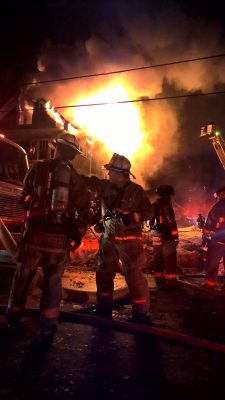Author: IAFF Center of Excellence Staff
October 6, 2019
According to a study from the Journal of Occupational Health, roughly 20 percent of fire fighters struggle with post-traumatic stress disorder (PTSD) at some point during their career. That’s why behavioral health awareness and training must be a priority for ensuring that fire fighters know how to recognize the signs and symptoms and how to seek help.
For family and friends, it can be challenging to understand or recognize the symptoms of PTSD or know how to respond to a diagnosis. Understanding how to help a friend or loved one with PTSD can help foster stronger relationships and encourage healing.
To understand the differences between post-traumatic stress and the mental health diagnosis of post-traumatic stress disorder, see the IAFF Guide on Understanding PTS and PTSD.

Connecting With a Loved One Who Has PTSD
It’s important that family, friends and even the public know how to respond when a fire fighter shares concerns that he or she is experiencing PTSD symptoms. Loved ones may feel overwhelmed or afraid of the changes they see in their loved one. While family, friends and even strangers can never fully understand what a fire fighter has seen or experienced throughout their career, they don’t need to know every detail to offer empathy, support and kindness. Sometimes listening is enough.
Listening — Not Judging
For family and friends of fire fighters with PTSD, being a good listener is key for everyone. If you know a fire fighter living with PTSD, don’t pressure him or her to talk. Be prepared to listen without expectations or judgment. Family members and friends should make it clear that they care about what their loved one has to say.
Fire fighters with PTSD — and even those without this diagnosis — may need to have conversations about the trauma they experience. Talking can start the healing process, so family and friends should avoid giving advice or trying to fix the problem, but instead ensure that the fire fighter is heard.
Additional Tips to Help
In addition to listening, learning about PTS and PTSD symptoms is one of the most important things you can do to help a friend or loved one. If your fire fighter is willing to share, it may also be helpful to learn about triggers — the people, places, things and experiences that trigger symptoms. Other tips to help your loved one include:
- Providing love and support
- Don’t pressure a fire fighter into talking
- Let the fire fighter take the lead
- Be patient
- Accept (and expect) mixed feelings
- Establishing trust and safety
- Express commitment to the relationship
- Create routines
- Minimize stress at home
- Talk about the future and make plans
- Keep promises
- Emphasize the fire fighter’s strengths
- Encourage your loved one to ask for help
PTSD and other behavioral health conditions often impact the entire family, not just the individual fire fighter. If you are a spouse or loved one of a fire fighter struggling emotionally, taking care of yourself and accessing support is just as important as taking care of your fire fighter. See the IAFF Family Resource Guide to learn more.
If an IAFF member you know exhibits signs and symptoms of PTSD or a substance use disorder, help is available. The IAFF Center of Excellence provides comprehensive care for mental health or substance use disorders and is designed specifically for fire fighters. Call today to learn more.
